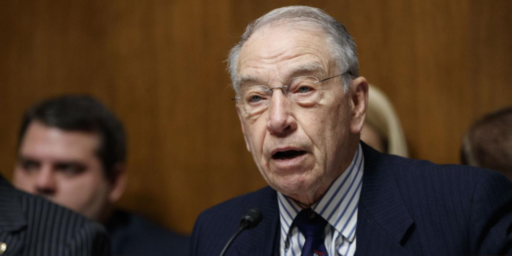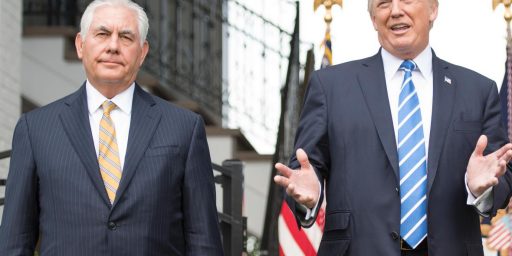McConnell, Other Republicans, Blocking Criminal Justice Reform [Updated: Vote To Go Forward]
Senator Mitch McConnell and others are blocking a criminal justice reform bill currently pending in the Senate.

Despite the backing of President Trump for a sentencing reform bill that has already passed the House of Representatives, the odds of such a bill passing before the current Congress comes to an end at the end of the year appears to be diminishing given the fact that Senator Mitch McConnell is showing no inclination to bring the bill to the floor for a vote:
Senate Majority Leader Mitch McConnell’s reluctance to hold a vote on a popular criminal justice bill has angered top Republican senators and created an unusual rift with a longtime GOP ally, Sen. Chuck Grassley of Iowa. And on Friday, it also brought on a tweet from President Donald Trump.
“Hopefully Mitch McConnell will ask for a VOTE on Criminal Justice Reform,” Trump tweeted. “It is extremely popular and has strong bipartisan support. It will also help a lot of people, save taxpayer dollars, and keep our communities safe. Go for it Mitch!”
Minutes later Grassley tweeted that he and the president had spoken about “the growing support” for the legislation.
“Pres Trump told me he wants it done THIS CONGRESS,” Grassley tweeted.
Grassley has spent years working to build a coalition around the bill and is pushing for a year-end vote. Grassley says more than two-thirds of the Senate supports it. But McConnell is refusing to bring the legislation forward in a standoff that’s dividing the Republican majority and putting President Donald Trump on the spot.
“We’ve done what needs to be done,” Grassley said about the overwhelming support for the bill. “So what’s holding it up?”
For the 85-year-old chairman of the Judiciary Committee, this is not the way the Senate is supposed to operate. Grassley was expecting some deference from McConnell after delivering on Trump’s judicial nominees — including two now on the Supreme Court. Despite Trump’s support for the measure, McConnell says it’s divisive. His reluctance to take up Grassley’s priority shows the limits of the Senate’s old-fashioned customs in an era of heightened partisan politics.
“What’s so irritating about this is, first of all, he and I have been hand-in-glove working to get the judiciary vacancies filled,” Grassley told Iowa reporters.
“I think I ought to have some consideration for delivering on tough Supreme Court nominees, and a lot of tough circuit court nominees and maybe even once in a while you get a tough district court nominee,” Grassley went on.
(…)
The bill is a project of Trump’s son-in-law, White House adviser Jared Kushner, and would be the biggest sentencing overhaul in decades. It would reduce mandatory prison terms for certain drug crimes and give judges in some cases more discretion on punishments. It would allow about 2,600 federal prisoners sentenced for crack cocaine offenses before August 2010 the opportunity to petition for a reduced penalty. It also includes provisions to encourage education and workforce training in prisons.
Roughly 90 percent of prison inmates are held in state facilities and would not be affected by the legislation.
While Kushner has been meeting with senators on Capitol Hill, Trump is also hearing from allies who are against the legislation. Chief among them is Sen. Tom Cotton, R-Ark., who is warning senators that Republicans will be blamed if criminals are released and commit new crimes.
“Only thing worse than early release from prison of thousands of serious, violent, & repeat felons is to do that in a spending bill with no debate or amendments, forcing senators to either shut down government or let felons out of prison,” Cotton tweeted Friday. The spending bill will need approval by Dec. 21 to avoid a funding lapse days before Christmas.
Cotton and others, including Sen. John Cornyn of Texas, No. 2 Senate Republican, insist there is not as much support for the bill as Grassley claims. Cotton says senators may tell the chairman they’re in favor of it when actually they’re not.
The bill has support from several conservative and liberal advocacy groups, uniting such disparate partners as the influential Koch network and the American Civil Liberties Union, but it splits law enforcement groups. It is backed by the Fraternal Order of Police and the International Association of Chiefs of Police but opposed by the National Sheriff’s Association.
Amid this divide, McConnell has been choosing caution, saying there’s just not enough time to push the bill forward in the remaining days of the Congress.
“The question is, can you shoe-horn something that’s extremely controversial into the remaining time?” he said Monday in an interview at a Wall Street Journal forum.
As noted, McConnell is joined in opposition to the bill by other members of the Senate GOP leadership such as Majority Whip John Cornyn and, most prominently, by Arkansas Senator Tom Cotton who has been an outspoken opponent of a bill that he claims would let thousands of violent offenders out of prison even though it would do no such thing. In fact, the vast majority of the bill addresses the excessive sentences that have been imposed on non-violent drug offenders, sentences that have generally been based solely on the amount of illegal drugs found in a Defendant’s possession. Indeed, for the most part, inmates with a violent criminal record are specifically excluded from taking advantage of most of the provisions of a bill. Cotton and McConnell are therefore engaging in fear-mongering in order to avoid even bringing the bill to a vote because they know that it would pass easily if it was brought to the floor.
As Taylor Millard notes at Hot Air, Cotton has been especially problematic on this bill, taking a staunch “law and order” position that essentially denies any need for the bill. In an article in National Review back in November, for example, completely misrepresents the contents of the bill:
When proponents of the bill discuss the substance, they claim that “nothing in the FIRST STEP Act gives inmates early release.” Instead of early release, proponents say, it merely provides incentives for inmates to participate in programs. This is nothing but a euphemism. Let there be no doubt: If the bill is passed, thousands of federal offenders, including violent felons and sex offenders, will be released earlier than they would be under current law. Whatever word games the bill’s proponents use will make no difference to the future victims of these felons.
Proponents also claim that only “low-level, non-violent” offenders will benefit, and that there are adequate safeguards to protect the public. If I believed these assertions, I would support the FIRST STEP Act. But a careful reading of the bill’s text, as opposed to the talking points used to promote it, shows that violent felons are eligible for early release, and that many of the bill’s provisions go against core conservative principles.
Cotton also cites an argument typically used by conservatives and libertarians by opining it would inappropriate to trust bureaucrats to make good decisions – especially since administrations tend to change from one party to the other. However, there’s very low turnover in BOP leadership – meaning the director tends to stay on the job through multiple presidential administrations regardless of political party. The agency is going to have only its tenth director (whenever Trump decides to appoint a new one) in almost 100 years – a rarity in politically-appointed offices which tend to change leadership with each incoming administration.
“[T]he legislation doesn’t ask ‘government bureaucrats’ to ‘judge the state of a felon’s soul,'” Utah Senator Mike Lee declared in a National Review article rebutting Cotton. “Rather, it directs experienced law-enforcement officers to determine whether an offender is a danger — a job they already do daily, in order to run the nation’s federal prisons. Similar risk assessments have already been implemented in Texas and Georgia, and these states are hardly the post-apocalyptic criminal hellscapes that Cotton predicts such a system would cause.”
(…)
“I don’t find this at all at odds with any sort of ‘law and order’ stance,” Right on Crime Director Derek Cohen told me over the phone citing the changes made to the bill when it comes to sentencing. “You have 924c which essentially, you know, that was made to punish repeat offenders and the way it’s applied is you have one indictment with three counts of the same exact crime and that triggers the enhancement. That in and of itself is not even how the law was meant to operate. You have things like the 841 and 851 slight reduction in mandatory minimum enhancements. That’s just taking down the minimum, that doesn’t mean where we stop counting for the prison years – that’s where we start counting for the prison years.”
“First Step Act is about prisoner accountability,” [FreedomWorks Vice President of Legislative Affairs Jason] Pye confidently stated. “Prisoners have to complete certain programming – recidivism reduction programming – and then if they do complete it and successfully lower their risk, those who have lowered their risk to minimal or low-risk of recidivism can earn time credits, use those time credits to be placed in home confinement or halfway house…This is about accountability.”
This latest development comes despite the fact that President Trump has endorsed the bill currently before the Senate, largely at the urging of his son-in-law Jared Kushner, and has reportedly urged McConnell to allow the bill to go forward. Despite this and the urging of many fellow Republicans, McConnell appears unlikely to bring up the bill before the Senate adjourns for the year. If this happens, it would mean that the advocates for the bill, which has bipartisan support in both the House and the Senate, would have to start all over again when the new Congress convenes in January, Given the fact that it has bipartisan support and is backed by groups as diverse as the American Civil Liberties Union and FreedomWorks that shouldn’t be so difficult. Even then, though, the bill still faces an uncertain future. While it would sail easily through the new Democratic-controlled House, it’s fate in the Senate would still be unclear thanks to the opposition of McConnell, Cotton, and other top Republican Senators. The bill itself needs to be passed, and the fact that he’s supporting it is one of the few things President Trump has done right, but unless McConnell relents it’s likely to die in the Senate.
Update: Shortly after this was published, The Hill reported that Senator McConnell had agreed to bring the First Step Act up for a vote:
Senate Majority Leader Mitch McConnell (R-Ky.) said on Tuesday that he will bring up a bipartisan criminal justice bill up for a vote, marking a significant win for supporters including President Trump.
“At the request of the president and following improvements to the legislation that has been secured by several members, the Senate will take up the recently revised criminal justice bill,” McConnell said from the Senate floor.
Backers and advocates have been publicly and privately lobbying McConnell for months to bring the bill to the floor, arguing that they have at least 70 votes in support of the legislation. The bill, spearheaded by Sens. Chuck Grassley (R-Iowa) and Dick Durbin (D-Ill.), merges a House-passed prison reform bill aimed at reducing recidivism with four changes to sentencing laws.
McConnell’s remarks are a dramatic turn around from last week, when he appeared to warn at a Wall Street Journal event that he did not have time to move the criminal justice bill this year, which he said could take up to 10 days.
“It’s extremely divisive inside the Senate Republican conference, in fact there are more members in my conference that are either against it or undecided than or for it,” McConnell said at the event. “This is a one-week to 10-day bill and I’ve got two weeks.”
But Durbin and Grassley have been circulating a draft that includes changes meant to win over more GOP support. The new version of the bill is expected to released as soon as Tuesday.
If this is accurate, it’s a welcome change of heart from McConnell. It’s only a half-step, though. The next step is to ensure that the bill gets the support it needs to get passed in the Senate.






The story of the First Step Act is super frustrating for those of us working in this space.* Its far from perfect, but it would definitely help people in Federal Prison.
The bi-partisan support is a little more mixed than it’s made out to be. This is actually a bill far more embraced by conservative criminal reform groups than liberals. In part that’s because it doesn’t really address sentencing reform and it provides some new powers to the Justice Department and the AG (both are big sticking points, especially when Sessions was in office). That said there are definitely some liberal groups (especially those associated with Van Jones) that are on board with this one.
BTW, Cotton’s lies about the act are particularly egredious, petty and just simply mean.
(*Disclaimer: my organization doesn’t have a set position on the First Step Act)
Ok, an McConnell announces that the Senate will take up the legislation:
https://www.washingtonpost.com/politics/mcconnell-to-bring-up-criminal-justice-bill-for-a-senate-vote/2018/12/11/64762750-fd57-11e8-ba87-8c7facdf6739_story.html?utm_term=.a55aae148dee
I’m interested to see if it gets tied to anything else…
Also a procedural question: if the Senate passes it in 2018, then can the reconciliation process happen in 2019 or is everything reset? Because my understanding is that there are some differences between the House and Senate legislation…
@mattbernius:
The bill will have to pass the House and Senate as-is before the end of the current term of Congress Otherwise, Congress will adjourn sine die and they’ll have to start all over again.
@Doug Mataconis:
That was what I thought Doug. So basically this is going to force the House into overtime as well (provided it passes the Senate, which last I checked they have the votes for).
For those interest, Vox has a really good and fair breakdown of the First Step Act:
https://www.vox.com/future-perfect/2018/12/3/18122392/first-step-act-criminal-justice-reform-bill-congress
It’s a mixed bag, but mostly a good bill — not aggressive enough, but a start.
I’m surprised the Trump administration supports it, but I’ll shrug and accept that no one can actually be 100% wrong.